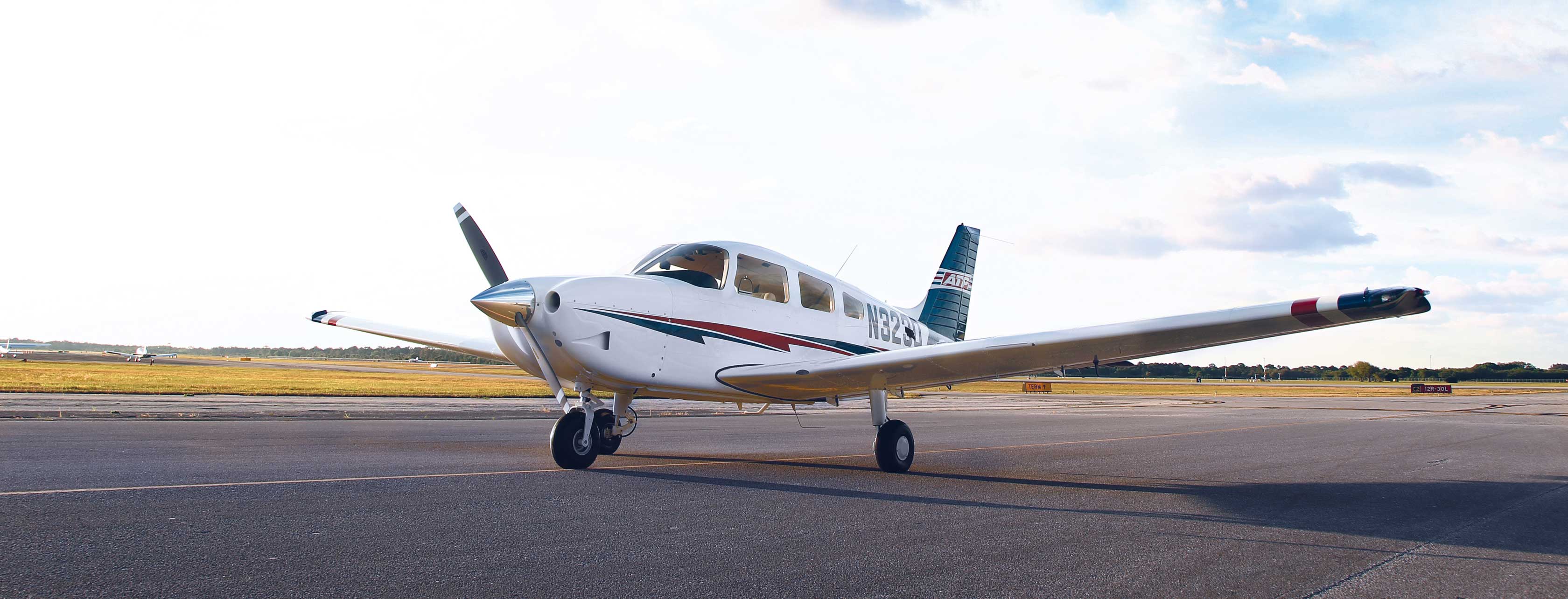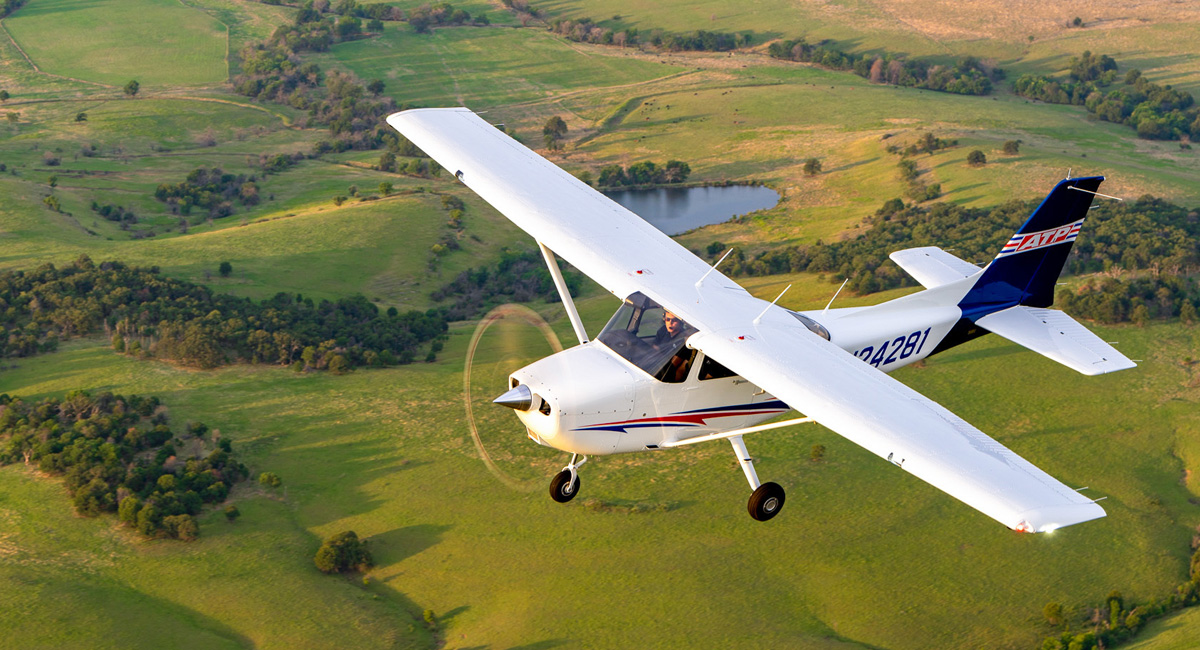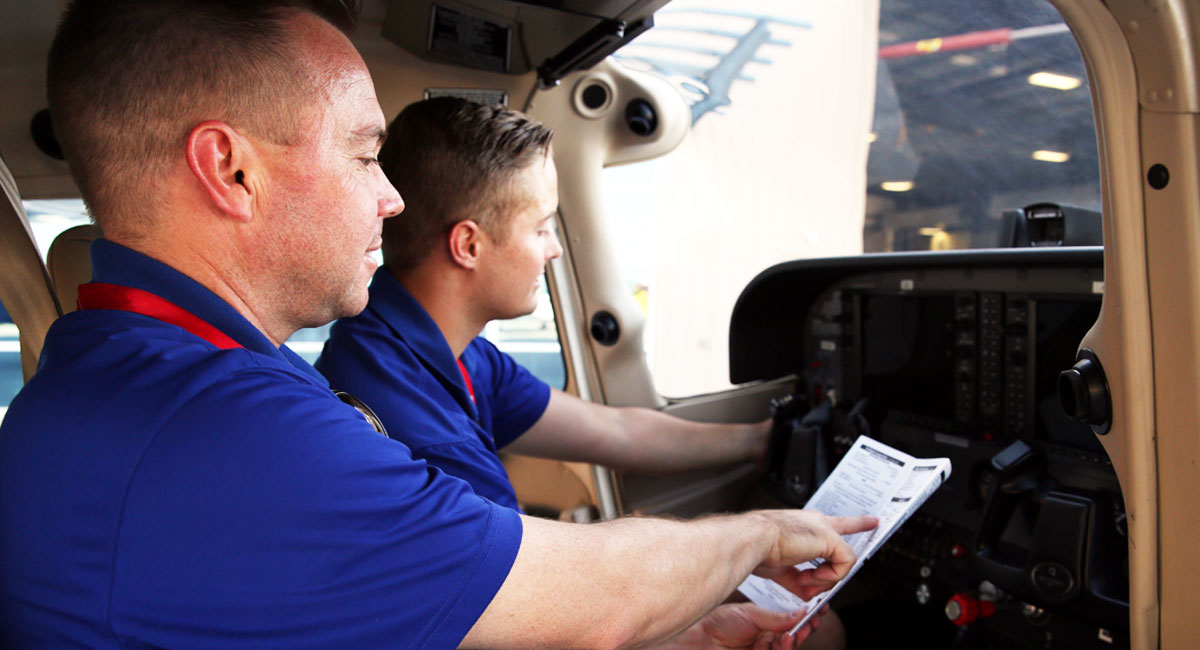

With ATP's fast track, total immersion pilot training, you will complete the Airline Career Pilot Program with all the certification you need for employment as a professional pilot in just twelve months.
Many factors such as local weather, winter conditions, examiner availability, as well as your dedication, availability, and ability to absorb information quickly can affect your training timeline and can lengthen the duration of your program. While ATP does not guarantee program completion time, our nationwide network of resources, training centers, aircraft and examiners works to lessen the impact of delays.
Choose Your Starting Point
From Zero Time From Solo From Private PilotTake Your First Flight
Discover what it's like to train with ATP by scheduling your first no-obligation training flight today!
Your Admissions Flight is a great way to get a taste of what a typical flight lesson at ATP entails, with an introduction to the fundamentals of flight and airline-oriented instruction. During your flight, our instructor will guide you through each maneuver, allowing you to take the controls and feel the excitement of flying.

Begin Program with Zero Experience and Graduate in 12 Months
Begin with Credit for Solo and Graduate in 11 Months
Begin with Credit for Your Private Pilot Certificate and Graduate in 9 Months
Private Pilot
The first step towards becoming an airline pilot is earning your Private Pilot Certificate.
The first step towards becoming a commercial pilot is earning your single-engine Private Pilot Certificate. Keeping your end goal in mind — ATP's philosophy is to deliver airline-style training and flight experience at the very onset of a pilot's training career. This is accomplished through standardized operating procedures and training students to a high level of proficiency. In your primary training stage, you'll learn the fundamentals of flight and accomplish your first solo.
What's IncludedPrivate Pilot (with single-engine privileges)
Typical Training DayDuring the first two weeks of training, you'll attend ATP Elevate Ground School sessions, five days per week, and complete 35 hours of private pilot ground school.
For the remainder of your training, and as directed by your flight instructor and the program outline, each day you will participate in guided independent study (online modules, reading, research, "chair flying", etc.), group study (with students in similar stages of training), and/or flight lessons with related briefings. In addition, some days include simulator lessons, individual ground lessons and/or group ground lessons.
To keep your training on time, the single-engine private pilot checkride may be scheduled at a location other than your primary training center. In such cases, travel will be required and ATP will coordinate transportation and housing as necessary.
Add multi-engine privileges to your private pilot certificate, allowing you to fly larger complex aircraft. While the principles of flight remain the same, learning to fly the multi-engine Piper Seminole will involve new concepts such as multi-engine aerodynamics, emergency operations, and more sophisticated systems.
What's IncludedAs directed by your flight instructor and the program outline, each day you will participate in guided independent study (online modules, reading, research, "chair flying", etc.), group study (with students in similar stages of training), and/or flight lessons with related briefings. In addition, some days include simulator lessons, individual ground lessons and/or group ground lessons.
To keep your training on time, the multi-engine rating checkride may be scheduled at a location other than your primary training center. In such cases, travel will be required and ATP will coordinate transportation and housing as necessary.
Private Pilot
The first step towards becoming an airline pilot is earning your Private Pilot Certificate.
The first step towards becoming a commercial pilot is earning your single-engine Private Pilot Certificate. Keeping your end goal in mind — ATP's philosophy is to deliver airline-style training and flight experience at the very onset of a pilot's training career. This is accomplished through standardized operating procedures and training students to a high level of proficiency. In your primary training stage, you'll learn the fundamentals of flight.
What's IncludedPrivate Pilot (with single-engine privileges)
Typical Training DayDuring the first two weeks of training, you'll attend ATP Elevate Ground School sessions, five days per week, and complete 35 hours of private pilot ground school.
For the remainder of your training, and as directed by your flight instructor and the program outline, each day you will participate in guided independent study (online modules, reading, research, "chair flying", etc.), group study (with students in similar stages of training), and/or flight lessons with related briefings. In addition, some days include simulator lessons, individual ground lessons and/or group ground lessons.
To keep your training on time, the single-engine private pilot checkride may be scheduled at a location other than your primary training center. In such cases, travel will be required and ATP will coordinate transportation and housing as necessary.
Add multi-engine privileges to your private pilot certificate, allowing you to fly larger complex aircraft. While the principles of flight remain the same, learning to fly the multi-engine Piper Seminole will involve new concepts such as multi-engine aerodynamics, emergency operations, and more sophisticated systems.
What's IncludedAs directed by your flight instructor and the program outline, each day you will participate in guided independent study (online modules, reading, research, "chair flying", etc.), group study (with students in similar stages of training), and/or flight lessons with related briefings. In addition, some days include simulator lessons, individual ground lessons and/or group ground lessons.
To keep your training on time, the multi-engine rating checkride may be scheduled at a location other than your primary training center. In such cases, travel will be required and ATP will coordinate transportation and housing as necessary.
Instrument Rating
Add an instrument rating to your private pilot certificate, which will allow you to fly in all kinds of weather.
Airlines conduct flights under Instrument Flight Rules (IFR), allowing them to fly in less than ideal weather conditions. Accordingly, these pilots must have an Instrument Rating. During this stage, students conduct flights under simulated instrument conditions and learn IFR procedures such as approaches, holds, arrival and departure procedures, and emergency operations.
Not unlike other stages of the program, students are trained using standard operating procedures, flows, and callouts. This practice not only increases safety and consistency, but will prepare students for flying in the airline environment.
What's IncludedDuring the first two weeks of training, you'll attend ATP Elevate Ground School sessions, five days per week, and complete 35 hours of instrument ground school.
For the remainder of your training, and as directed by your flight instructor and the program outline, each day you will participate in guided independent study (online modules, reading, research, "chair flying", etc.), group study (with students in similar stages of training), and/or flight lessons with related briefings. In addition, some days include simulator lessons, individual ground lessons and/or group ground lessons.
To keep your training on time, the instrument rating checkride may be scheduled at a location other than your primary training center. In such cases, travel will be required and ATP will coordinate transportation and housing as necessary.
$5,000 Tuition Reimbursement — Earn $5,000 at this stage of your flight training through the Horizon Pilot Development Program.
Commercial Pilot
After gaining crew-style flight experience, earn your single-engine Commercial Pilot Certificate.
After completing the crew-style flying stage, students will begin preparing for their single-engine Commercial Pilot Certificate, eventually allowing them to be paid to fly. As a commercial pilot, new flight maneuvers are introduced and existing ones are held to tighter tolerances. Prior to completing the commercial pilot practical test, 10 hours of Technologically Advanced Aircraft training will have been conducted either at your primary training center or at another location.
Airline Career Pilot Program students can accelerate their path to airline hiring minimums by starting ATP's exclusive Airline Direct Track after earning their Commercial Pilot certificate.
What's IncludedCommercial Pilot (with single-engine privileges)
Typical Training DayAs directed by your flight instructor and the program outline, each day you will participate in guided independent study (online modules, reading, research, "chair flying", etc.), group study (with students in similar stages of training), and/or flight lessons with related briefings. In addition, some days include simulator lessons, individual ground lessons and/or group ground lessons.
To keep your training on time, the commercial pilot checkride may be scheduled at a location other than your primary training center. In such cases, travel will be required and ATP will coordinate transportation and housing as necessary. Additionally, if no previous training was conducted in Technologically Advanced Aircraft, you may be required to travel to another training center for up to two weeks to accomplish this training.
Flight Instructor
Become a flight instructor – the best way to gain experience and meet airline minimums.
Two months of the program are devoted to developing students into Certificated Flight Instructors (CFI). During the flight instructor stage students learn the fundamentals of instruction and hone their ability to effectively teach and communicate the knowledge and experience they have attained throughout the program.
Becoming a CFI allows you to begin earning an income in your new career while you gain the flight experience needed to meet airline minimums.
ATP Flight School instructors set the industry standard for professional airline-oriented flight training. The quality and professionalism of ATP instructors have been consistently recognized by AOPA and the National Association of Flight Instructors.
What's IncludedFlight Instructor (with single-engine and instrument privileges)
You will earn your multi-engine instructor add-on rating later in the program.
Typical Training DayThe first two weeks of the flight instructor stage consists of instructor-led remote ATP Elevate Ground School, requiring full time virtual participation from your home.
As directed by your flight instructor and the program outline, each day you will participate in guided independent study (online modules, reading, research, "chair flying", etc.), group study (with students in similar stages of training), and/or flight lessons with related briefings. In addition, some days include simulator lessons, individual ground lessons and/or group ground lessons.
Depending on where you choose to train, you may be required to travel to another location. In such cases, travel will be required and ATP will coordinate transportation and housing as necessary.
Multi-Engine Add-Ons
Add multi-engine ratings to your existing certificates, allowing you to operate faster, larger aircraft.
Begin flying the Piper Seminole to add multi-engine privileges to your certificate. While the principles of flight remain the same, learning to fly the multi-engine Seminole will involve new concepts such as multi-engine aerodynamics, emergency operations, and more complex systems. This stage of the program also includes the flight time necessary to ensure that you'll meet Airline Transport Pilot certificate requirements later in your career and be eligible for airline pilot employment.
What's IncludedIncludes the flight time necessary to ensure that you'll meet Airline Transport Pilot certificate requirements later in your career and be eligible for airline pilot employment.
Aircraft Flown Privileges EarnedAs directed by your flight instructor and the program outline, each day you will participate in guided independent study (online modules, reading, research, "chair flying", etc.), group study (with students in similar stages of training), and/or flight lessons with related briefings. In addition, some days include simulator lessons, individual ground lessons and/or group ground lessons.
Depending on where you choose to train, you may be required to travel to a Piper Seminole location. In such cases, travel will be required and ATP will coordinate transportation and housing as necessary.
$7,500 Tuition Reimbursement — Earn $7,500 at this stage of your flight training through the Horizon Pilot Development Program.
Fly as a Flight InstructorATP is hiring Airline Career Program graduates for CFI jobs! Work towards the minimum airline hiring requirement of 1,500 hours as a certificated flight instructor (CFI) with ATP. As an ATP flight instructor, you will:

Airline Career Pilot Program students have the option to accelerate their path to 1500 hours with ATP's exclusive Airline Direct Track after earning their Commercial Pilot certificate.
Tuition Reimbursement & Airline Direct Programs
While flying as a flight instructor, you can earn airline-sponsored tuition reimbursement and fast track your career with exclusive Direct Programs.
As an ATP instructor, you'll be able to take advantage of the best competitive offers and exclusive partnerships, including airline-sponsored tuition reimbursement, cadet programs, and Airline Direct Programs for accelerated career progression.
ATP's partner airlines will contribute financially toward the cost of your flight training. Only at ATP can you earn $17,500 in airline-sponsored tuition reimbursement from SkyWest as a flight instructor. Visit CommuteAir, Horizon Air, PSA Airlines, and SkyWest to learn how it works.